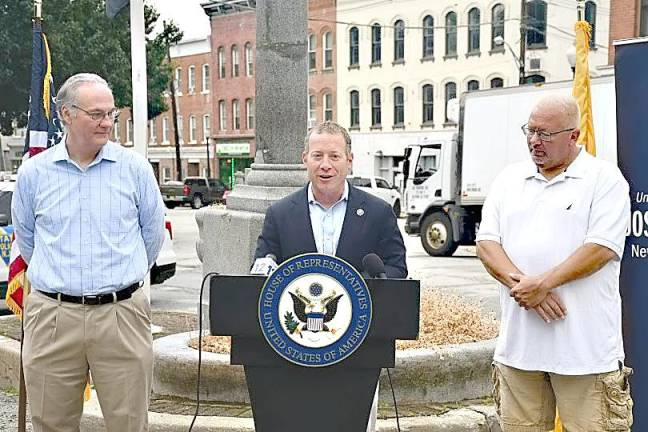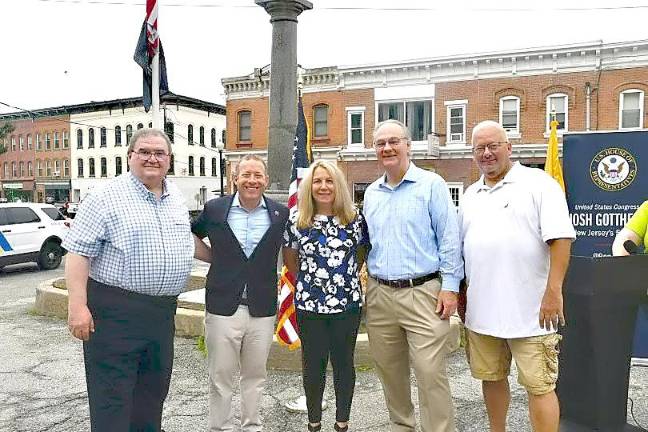Sussex County receives cash influx to shore up water problems
SUSSEX BOROUGH. Multiple grants are coming to the county to help stop leaking pipes and upgrade outdated systems.


U.S. Congressman Josh Gottheimer (NJ-5), along with Sussex Borough Mayor Ed Meyer, Sussex Borough Council President Robert Holowach, and Sussex Township Administrator Jim DeBlock, recently announced a new $100,000 federal investment for Sussex County to help fix critical water infrastructure — including repairing older leaking pipes that can cause water contamination.
According to Gottheimer’s announcement, this new investment will help Sussex Borough acquire an acoustic leak detection system to detect leaks and repair them before they become pipe breaks. It will also help make necessary repairs to the 100-year-old water main. Local leaders say this investment will help ensure that residents of Sussex Borough and Wantage have access to clean water for decades to come.
While leaky pipes can lead to loss of water and expensive repairs, they could also introduce contaminants and bacteria into our water systems. According to the Centers for Disease Control and Prevention, water main breaks can result in serious microbial or chemical contamination because a drop in pressure can lead to non-potable water entering the system. Water main breaks can flood entire neighborhoods, wreak havoc on traffic, cause water shortages, and waste millions of gallons of treated water.
“For years now, it’s my top priority to get clean drinking water for our children and families and I’ve been fighting in Congress to claw more tax dollars back to Jersey. A critical $100,000 bipartisan federal investment has now been signed into law to help fix older pipes, detect leaks, reduce water contamination, and help prevent pipes impacting Sussex County residents in Wantage and Sussex Borough,” said Gottheimer. “With bipartisan legislation I helped pass and get signed into law, and the $1 billion for water infrastructure I helped secure for Jersey through the bipartisan infrastructure bill, we’re helping get bacteria, contaminants, lead, and forever chemicals out of our drinking water [...] The more of our federal tax dollars that we get back to Northern New Jersey, the less our towns have to charge in local taxes — and I’m all about lowering taxes.”
“The congressman has been a great ally of Sussex Borough over the years. He has reached out to us to gain understanding of our needs and find resources available,” said Sussex Borough Mayor Ed Meyer. “Being selected by the congressman as a project for direct funding has improved our ability to address our sewer and water needs without drastically increasing our rates or negatively impacting the quality of life of our residents. Every dollar Sussex receives in grants is one dollar less the residents of Sussex Borough must fund.”
More Water Safety
Separate from Gottheimer’s announcement, the NJ Department of Environmental Protection (DEP) also announced the recipients of several grants aimed at improving water quality and reducing the effects of climate change. A few of the local grant winners are listed below.
The Greater Culver Lake Watershed Conservation Foundation, which works to “protect and preserve the greater watershed environment of the northern Paulinskill River including the sub watersheds of Lake Owassa and Culver Lake,” received a grant of $137,025, to implement a project the DEP says will “significantly decrease septic-related phosphorus loading using easy to install, operate, and maintain septic system modification technology.”
The Sussex County Municipal Utilities Authority was granted $609,434 to install riparian forest buffers along Papakating Creek, enhance riparian forest buffers along Clove Brook, and install green infrastructure in Sussex Borough to reduce “nonpoint source pollution.” These measures are found within the approved Clove Brook Watershed Restoration Plan and the Papakating Creek Watershed Restoration Plan.
The NJ Department of Agriculture also earned a grant of $399,024.90 to implement Animal Waste Management Plans (AWMP) for livestock farms within 100 feet of a water body. This project is expected to improve water quality and reduce the impact of livestock on watersheds.
Funding for these projects has been provided through the federal Clean Water Act, the Department of Defense Readiness and Environmental Protection Integration funds, and the New Jersey Corporation Business Tax.
“These grants will help a diverse group of DEP partners implement projects – many of them deploying green infrastructure technologies – that will reduce the many harmful effects of stormwater that are increasing due to climate change,” said DEP Commissioner Shawn LaTourette. “We are excited to facilitate projects that will improve environmental protection, safety and quality of life in our communities, and address local flooding.”

